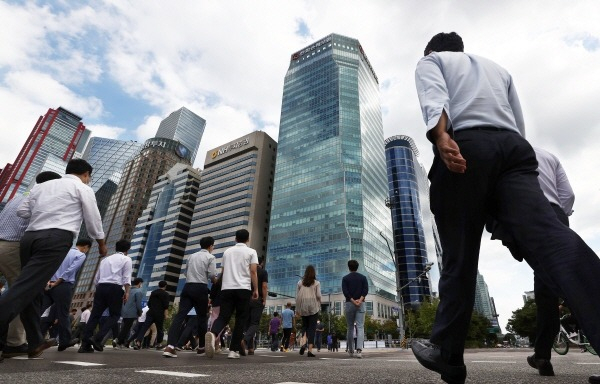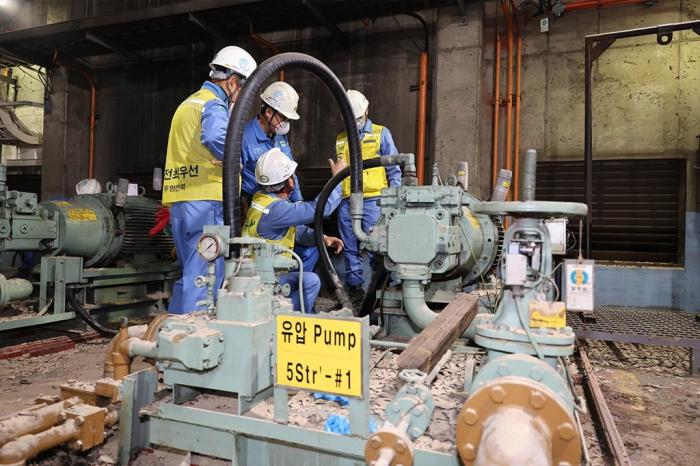Regulations
Koreans work longer hours than OECD average? Not in some sectors
Korea’s work hours are declining due to government curbs and MZers’ growing demand for a shorter workweek
By Oct 20, 2023 (Gmt+09:00)
2
Min read
Most Read
LG Chem to sell water filter business to Glenwood PE for $692 million


Kyobo Life poised to buy Japan’s SBI Group-owned savings bank


KT&G eyes overseas M&A after rejecting activist fund's offer


StockX in merger talks with Naver’s online reseller Kream


Mirae Asset to be named Korea Post’s core real estate fund operator



South Korea has had notoriously long working hours for decades.
Long hours – alongside high levels of education and an increase of women in the workforce – were once widely credited as fueling the country’s remarkable economic growth.
Now Asia’s fourth-largest economic powerhouse, Korea is witnessing its working hours steadily decreasing to the levels of the OECD rich nations’ club, due in part to government curbs and growing demand for shorter workweek from younger generations.
According to a Korea Enterprises Federation (KEF) report on Thursday, the working hours gap between Korea and the Organization for Economic Cooperation and Development average has been narrowed across many industries, and in some sectors, Koreans now work less than their OECD peers.
The federation said seven of 19 industries have shorter working hours than the OECD average as of 2022. The seven are agriculture and forestry; electricity, gas and steam supply; construction; finance and insurance; public services; education; and health and social welfare.
A KEF survey showed workers in some of those industries worked up to 7.1 hours shorter than the OECD average.

Analyzing nine industries where it is possible to compare the figures from 2021 and last year, the KEF said Korea’s average weekly working hours decreased by 11.1 hours while the OECD’s working hours fell by 1.4 hours.
The most significant reductions in working hours in Korea were found in the health and social welfare sector with a fall of 16.8 hours a week, followed by the accommodation and food service sector (16.1 hours), wholesale and retail (13.3 hours), public services (11.5 hours) and construction (10.6 hours).
The manufacturing sector, which has the highest proportion of employed workers in the country, saw a reduction of 9.8 hours.
A comparison of nine industries with a wage earner ratio of more than 80% among the entire workforce, including the self-employed, showed Korea’s and the OECD’s weekly working hours were nearly the same – 36.65 hours for Korea and 36.74 hours for the OECD average.
In seven other industries, Korea’s average weekly working hours stood at 39.31 hours, 2.64 hours longer than the OECD’s 36.67 hours.

FLEXIBLE WORK HOURS REQUIRED
The KEF said the government has imposed stricter working hour regulations uniformly due to the perception that Korean workers face some of the longest hours in the world.
“Contrary to previous perceptions, the working hours per week for full-time workers are not significantly different from the OECD average,” said Ha Sang-woo, head of economic research at the KEF.
“The country now needs to introduce flexible working hours that reflect the conditions of the labor market in order to enhance productivity and promote economic growth.”
In June, Samsung Electronics Co. said it is joining the global four-day workweek move, albeit only partially by allowing its employees to work four days a week once a month.
A study in March by the Korea Institute for Industrial Economics and Trade (KIET) showed Korea's Generation MZ, or people born in the early 1980s to early 2000s, prioritize income and working hours when looking for a job over personal development potential at work.
Write to Il-Gue Kim at Black0419@hankyung.com
In-Soo Nam edited this article.
More to Read
-
 ElectronicsSamsung Gangnam takes aim at Apple Store to lure MZers
ElectronicsSamsung Gangnam takes aim at Apple Store to lure MZersJun 29, 2023 (Gmt+09:00)
2 Min read -
 Leadership & ManagementSamsung Elec joins global 4-day workweek push for work-life balance
Leadership & ManagementSamsung Elec joins global 4-day workweek push for work-life balanceJun 12, 2023 (Gmt+09:00)
3 Min read -
 Food & BeverageLotte’s soju team applauded as MZers bedazzled by sugar-free Saero
Food & BeverageLotte’s soju team applauded as MZers bedazzled by sugar-free SaeroApr 21, 2023 (Gmt+09:00)
2 Min read -
 Culture & TrendsS.Korea's MZers consider income, working time most when job hunting: Survey
Culture & TrendsS.Korea's MZers consider income, working time most when job hunting: SurveyMar 03, 2023 (Gmt+09:00)
1 Min read
Comment 0
LOG IN


